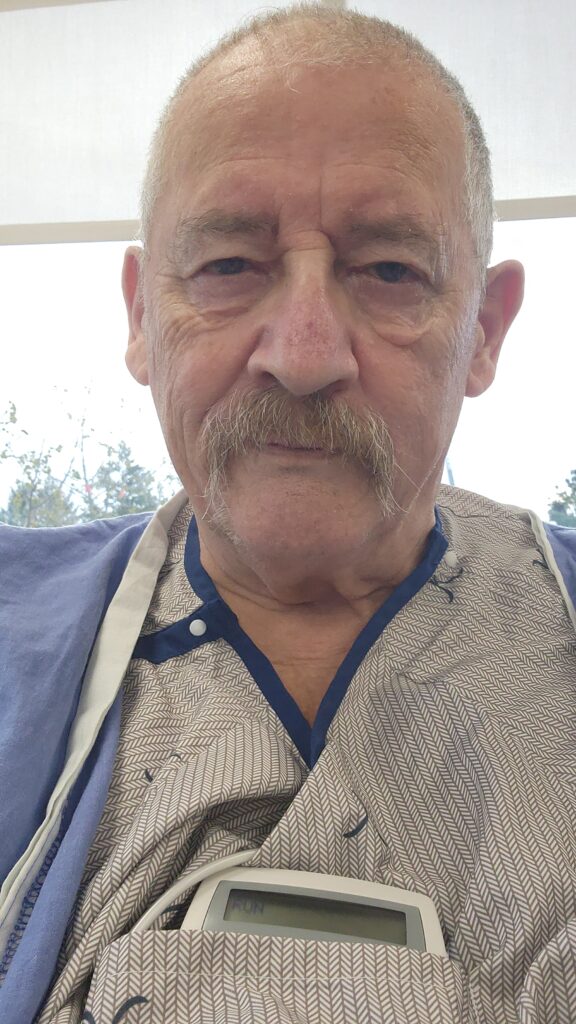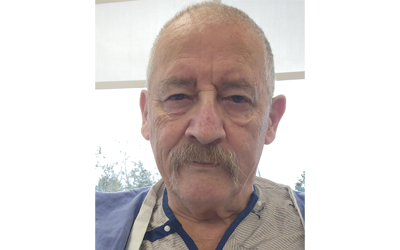Last year, we shared Ross McGaw’s story in Good News. Since then, Ross has started Duodopa® therapy, and we are pleased to provide an update on his progress below. You can read his earlier story here.
Ross McGaw’s journey with Parkinson’s disease (PD) has been shaped by resilience, from adapting his active lifestyle to confronting the cognitive and physical challenges of the disease head-on. Medication and consistent exercise helped him maintain relative stability for many years, but the progression of his symptoms eventually brought new hurdles that were harder to manage.
As a result of more unpredictable “off” times, Ross’ neurologist suggested Duodopa® as a possibility two or three years ago, which was the start of a new journey for him. Duodopa® is a levodopa and carbidopa combination in the form of a gel used to treat people with Parkinson’s who have responded well to levodopa but continue to experience severe motor fluctuations that are not satisfactorily controlled by oral medications. During the procedure, an opening, called a “stoma” is created, allowing for a tube to be inserted into the small intestine. The drug is then administered through the tube and regulated by a pump. Cassettes containing the intestinal gel are attached to the pump, worn continuously for 16 hours, and changed once a day. Because the delivery of the drug is continuous and regulated, it provides a more constant “on” period, thereby reducing motor symptoms of PD.

This year, Ross underwent surgery for Duodopa®. While the procedure itself took less than one hour, it was the time and cost of travel that posed a greater difficulty for Ross and his wife, Linda, who are from Nanaimo. The couple also had to come back to the Movement Disorders Clinic (MDC) at the University of British Columbia (UBC) for titration post-surgery, which is when the dosage of the medication is adjusted for the individual. This process took three days. Fortunately, the MDC provided them with a list of relatively low-cost accommodation options, including Airbnbs that were a ten-minute drive away from the hospital. Ross notes that during the titration process, there was ample opportunity to speak with the neurologist and nurse to have all their questions and concerns addressed.

Once back in Nanaimo, Ross says he was visited at home on three occasions by professionals from AbbVie, the pharmaceutical company who produces Duodopa®. They thoroughly explained and provided literature on how to administer the medication, as well as how to keep the tubes clean. Ross was given a choice of pump-carrying methods, and once he selected one, it was provided free of charge.
The medication cartridges are shipped monthly to Ross and Linda’s home at no cost, along with new syringes and connection cartridges, and must be refrigerated upon arrival. The only drawback is that the Styrofoam coolers used for shipping are not recyclable locally and must be returned to the supplier, though there is no financial cost, only the time required for packing and labelling. The same process applies to returning used cartridges. Ross notes that the annual cost of the Duodopa® medication is $75,000. He explains that BC PharmaCare determines a patient’s minimum annual payment before full coverage begins, and he says that they could not have managed this year’s treatment without the exceptional support provided by AbbVie Care.
Despite the financial and logistical challenges of traveling to the Lower Mainland for the procedure, Ross says these costs are small compared to the improvement in his symptoms, which include a significant reduction in the length of “off” or freezing periods. This predictability has allowed Ross to plan activities and outings in advance, something that was not possible before. He also no longer needs to count medications or take them orally, except for once at night after his pump is switched off, but he does stress the importance of keeping the stoma clean to avoid infection.

The benefits Ross has experienced since starting Duodopa® have also reopened possibilities he once believed were gone forever, including the ability to travel. These changes are in sharp contrast to a recent trip to the Isle of Man TT motorcycle races with his adult children – a trip that, instead of being a yearly highlight, became a medical ordeal, with Ross spending nine of fourteen days in hospital. After that experience, the idea of flying, or even driving the 1,200 kilometres to visit family, felt completely out of reach.
Visiting his son and daughter-in-law, both RCMP members living in Prince George, and seeing his two young grandsons felt impossible, and six years ago he would have confidently bet anyone a million dollars that long-distance travel was permanently behind him. He even rescinded his Canadian passport in 2019 because the idea of travel had become “laughable.” Yet now, with the stability and confidence Duodopa® has given him, Ross and his wife have booked flights to Prince George for January, and even the long drive up Highway 19 to visit his daughter, a registered nurse in Courtenay, is back on the menu.
Even though he experiences some minor side effects, such as sudden drowsiness and a softer voice, and even though he fully recognizes Duodopa® is not a cure-all that is appropriate for all people with Parkinson’s, Ross says he would never go back to the “before Duodopa®” days.
Duodopa® therapy represents a life-changing option for people living with advanced Parkinson’s disease whose symptoms can no longer be effectively managed with oral medications alone. For years, however, access to Duodopa® in British Columbia was extremely limited. Prior to 2017, the therapy was not covered by BC PharmaCare and cost approximately $60,000 annually. Even once coverage was introduced in February 2017, it was restricted to a small number of individuals. In fact, BC was the only province in Canada with an annual cap on the number of patients who could receive Duodopa®. This changed dramatically in late 2020, following sustained advocacy by movement disorder specialists, advocates with Parkinson’s and their loved ones, and Parkinson Society British Columbia, when the Ministry of Health announced the removal of the annual limit on Duodopa® coverage.
Today, Duodopa® serves as a powerful example of what coordinated advocacy can achieve, but as Ross’ story demonstrates, there are still significant barriers for individuals who must travel to the Lower Mainland to receive assessment, treatment, and follow-up care. Join us in advocating for timely, life-changing treatments for Parkinson’s. Together, we can reduce wait times and improve care for thousands of British Columbians. Your voice has the power to create a brighter future for those affected by this disease. Learn more and get involved at https://parkinson.bc.ca/advocacy
If you or a loved one are interested in Duodopa®, please speak with your doctor and healthcare team to determine if this treatment is suitable.

